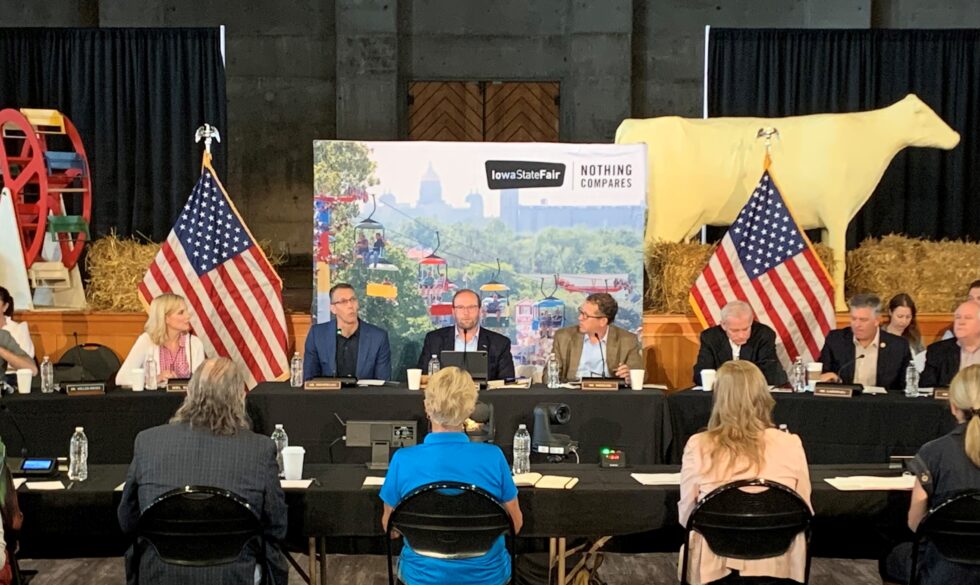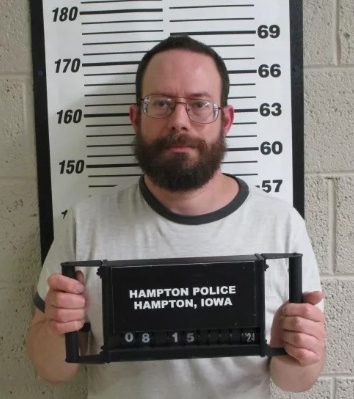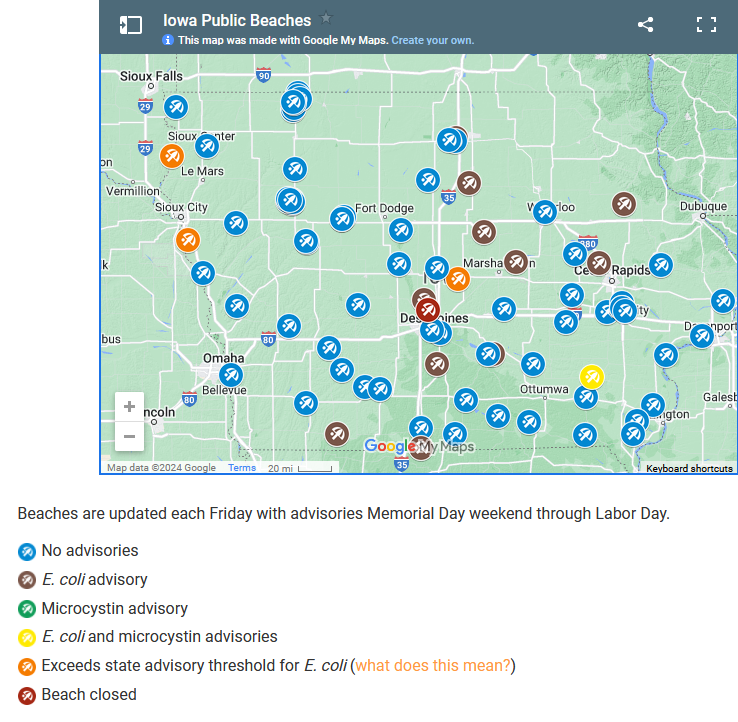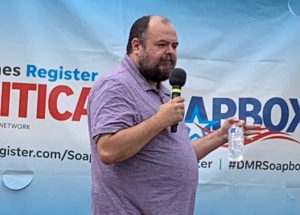KJAN News can be heard at five minutes after every hour right after Fox News 24 hours a day!
Keep up-to-date with Fox News Radio, Radio Iowa, Brownfield & the Iowa Agribusiness Networks!

KJAN News can be heard at five minutes after every hour right after Fox News 24 hours a day!
Keep up-to-date with Fox News Radio, Radio Iowa, Brownfield & the Iowa Agribusiness Networks!
COUNCIL BLUFFS, Iowa – A Council Bluffs woman was sentenced on Tuesday, August 13, 2024, to 122 months in federal prison for Conspiracy to Distribute Methamphetamine.
According to public court documents, Demi Lynn Jahn, 33, conspired with other individuals to distribute more than 50 grams of methamphetamine in the Council Bluffs metro area between March and June 2023. Jahn conspired with others including Leonires Perez, also known as “Flaco,” who was sentenced in May 2024 in the District of Nebraska to 248 months for conspiracy to distribute a controlled substance, and Virgil McIntosh, who was sentenced in April 2024 to 240 months in prison for conspiracy to distribute methamphetamine and possession of a firearm.
After completing her term of imprisonment, Jahn will be required to serve five years of supervised release. There is no parole in the federal system.
United States Attorney Richard D. Westphal made the announcement. This case was investigated by the Southwest Iowa Narcotics Enforcement Task Force, Council Bluffs Police Department, Iowa Division of Narcotics Enforcement, and Pottawattamie County Sheriff’s Office.
COUNCIL BLUFFS, Iowa – A Council Bluffs man was sentenced on Wednesday, August 14, 2024, to 48 months in federal prison for two counts of possessing a firearm as a drug user.
According to public court documents, Nicholas Paul Gilmore, 33, was found in possession of two firearms between August and September 2023. One of the firearms was stolen. During a search of Gilmore’s residence in August 2023, officers located methamphetamine, ammunition, and extended firearms magazines.
After completing his term of imprisonment, Gilmore will be required to serve three years of supervised release. There is no parole in the federal system.
United States Attorney Richard D. Westphal of the Southern District of Iowa made the announcement. This case was investigated by the Bureau of Alcohol, Tobacco, Firearms, and Explosives and the Council Bluffs Police Department.
This case is part of Project Safe Neighborhoods (PSN), a program bringing together all levels of law enforcement and the communities they serve to reduce violent crime and gun violence, and to make our neighborhoods safer for everyone. On May 26, 2021, the department launched a violent crime reduction strategy strengthening PSN based on these core principles: fostering trust and legitimacy in our communities, supporting community-based organizations that help prevent violence from occurring in the first place, setting focused and strategic enforcement priorities, and measuring the results. For more information about Project Safe Neighborhoods, please visit Justice.gov/PSN.
(Des Moines, Iowa) – An advocate for seniors is calling on the state auditor’s office to investigate the state’s failure to collect $10.7 million in fees owed by corporate nursing home owners. The auditor’s office says it has reported a state agency’s failure to collect the fees but has no enforcement authority. The Iowa Capital Dispatch reported last week that 49 Iowa nursing homes owe Iowa taxpayers more than $10.7 million in unpaid fees that are past due and which the state has so far failed to collect.
According to documents obtained through the state’s Open Records Law, one for-profit company based in West Des Moines operates 18 care facilities that collectively owe the state $3.6 million in unpaid fees. The company’s top two executives, meanwhile, have made $293,000 in political donations to Statehouse leaders, the governor and industry lobbyists.
The fees the state imposes on nursing homes, called Quality Assurance Assessment fees, are a mechanism that has been used since 2009 to artificially inflate the facilities’ cost of doing business. That increased expense enables the facilities to draw down more money in Medicaid reimbursement for resident care. Often, the increased Medicaid payments more than offset the cost of the fees paid to the state, resulting in a net gain for the homes.
By law, the care facilities are supposed to use that additional money to increase the compensation of front-line caregivers — which is why the fees are called Quality Assurance Assessment fees. It’s a circular, but legal, method of increasing the revenue collected by nursing homes and has been approved by the federal government in Iowa and other states.
However, not all Iowa homes are paying the fees and of those that do, up to 18% of them have failed to meet all of the legal requirements for spending their additional Medicaid revenue on pay increases for front-line caregivers. Two Iowa nursing home companies that have filed for bankruptcy in recent years did so while owing the state a combined total of $5 million in unpaid QAA fees. Some of those unpaid fees date back to at least 2019, according to court records.
John Hale, a consultant and advocate for Iowa seniors, says it appears to him that “taxpayers are getting taken to the cleaners” by nursing home companies. ” Hale said an investigation by the Iowa Auditor of State is warranted, in part to make sure nursing facilities that claim to be increasing staff pay are doing so.
In a written statement, Auditor of State Rob Sand said his office has publicly reported DHHS’ failure “to collect these fees as required by law. However, the auditor’s office isn’t an enforcement agency. We have no legal authority to force DHHS to collect the fees or impose penalties on the facilities that don’t pay them.”
The company that appears to owe taxpayers the most is Accura Healthcare of West Des Moines. Eighteen of the for-profit company’s Iowa care facilities are currently on payment plans with the state, and they now owe a combined $3,644,432.97, according to DHHS. Campaign finance records show that since 2015, Accura Healthcare’s CEO, Ted LeNeave, has personally donated more than $239,000 to GOP campaigns in Iowa and to the political action committee of the industry’s main lobbying organization. That total includes $54,500 LeNeave donated directly to Gov. Kim Reynolds’ campaigns, plus $76,000 LeNeave donated to Iowa Senate Majority Leader Jack Whitver of Grimes.
Since 2021, the president of Accura Healthcare, Lisa Toti, has made $36,000 in political donations in Iowa, including $16,000 contributed to Reynolds’ campaign committees.
(Radio Iowa) – A U-S House committee hosted a hearing at the Iowa State Fair today (Friday) to tout Trump-era tax cuts that are set to expire at the end of 2025. Steve Sukup, president and C-E-O of Sukup Manufacturing in Sheffield, says the tax reform law of 2017 was a shot in the arm to the manufacturing sector. “Thanks to lowering the corporate tax rate to 21%, Sukup grew our workforce by a third,” Sukup said, “adding 200 well-paying manufacturing jobs in our community.” Sukup also urged congress to address a tax policy which had allowed 100 percent of equipment purchases to be claimed in the year they’re made.
“Unfortunately, full expensing began to expire in 2023. We believe that was a mistake. It is common sense that our tax code should encourage investment that leads to growth,” Sukup says. “Many manufacturing teams, including our company, would benefit from seeing this provision restored and congress should do it immediately.” Iowa Corn Growers Association president Jolene Riessen, of Ida Grove, says being able to claim that expense in a single year is a big deal when buying farm equipment, since a new combine costs 750-thousand dollars.
“Being able to use that 100% depreciation now it just freed up money so I can make those payments,” Riessen said. “You know, people have 20 to 30 years to pay off a house. Nope, I’ve got to pay off in three to five years.” Riessen and Lana Pol, of Pella, who owns four businesses, urged federal lawmakers to address inheritance taxes, too. “While I agree with others that this tax should be eliminated entirely, if congress does not at least act to preserve the expanded exemption of the estate tax, it will be increasingly harder to pass if from generation to generation,” she said.

The U.S. House Ways and Means Committee convened a field hearing at the Iowa State Fair on Aug. 16, 2024. (RI photo)
The standard deduction and child tax credit doubled in 2017 and are set to return to previous levels at the end of 2025. Sarah Curry, of Glenwood, is the mother of three boys and most of the services for her youngest, who has been diagnosed with autism, are not covered by insurance. She says the increased child tax credit and standard deduction for each child has made a difference. “I mean, every dollar that my husband and I earn that we get to keep goes to our children,” Curry says. “…Reducing it by any amount would negatively impact my family, our children and our ability to pay for services.”
Curry, who is the research director for Iowans for Tax Relief, says if she and her husband pay more in federal taxes, they’ll likely pay more in state income taxes. That’s because federal taxable income is the starting point for calculating how much is owed in state income taxes. Congressman Randy Feenstra is a member of the House Ways and Means Committee, that panel that held today’s (Friday’s) hearing about the Trump-era tax cuts. “But if all these things go away, it will have a dramatic effect, for our families, for our businesses, for our Main Streets,” Feenstra said, “…and so many other things.”
The three other Iowa Republicans who serve in the U-S House also attended the hearing.
(Radio Iowa) – A man has been charged following the investigation of signs posted on the doors of Latino-owned businesses in Hampton. The signs were placed on the doors of numerous Hispanic businesses Tuesday morning. The flier, with a black-and-white image, reads: “U-S-A Illegal Immigrant Hunting Permit – No Bag Limit – Tagging Not Required,” and at the bottom it said “Trump 2024.”

Daniel Alan Embree
Hampton Police Chief Mark Morrison announced a search warrant was executed Thursday at a residence and in Hampton and Daniel Alan Embree was charged with eight counts of second-degree harassment, and trespassing with intent to commit a hate crime. Morrison said the investigation is ongoing.
(Des Moines, Iowa) – Officials with the Iowa Environmental Council (Citing the weekly Iowa Department of Natural Resources data), today (Friday), report a total of 14 beaches in Iowa are under advisories for excessive E. Coli levels. Advisories are issued when bacteria standards for safe swimming are exceeded.
All State monitored beaches are posted with Information Signs on indicator bacteria and blue-green algae toxins that provide general information regarding ways to reduce the potential health risk associated with swimming at public beaches. These signs will also inform the public of current monitoring efforts and ways to obtain the data. Water samples from the beaches are analyzed for microorganisms, known as bacteria and cyanobacteria toxins. These indicator bacteria are one-celled organisms visible only under a microscope.
High levels of these bacteria indicate that the water has come into contact with fecal material. 
13 Beaches with an E. coli Advisory:
Backbone Beach (Dundee, Delaware County, IA)*
Beed’s Lake Beach (Hampton, Franklin County, IA)*
Big Creek Beach (Polk City, Polk County, IA)*
Clear Lake Beach (Clear Lake, Cerro Gordo County, IA)*
Lake Ahquabi Beach (Indianola, Warren County, IA)*
Lake Darling Beach (Brighton, Washington County, IA)*
Lake of Three Fires Beach (Bedford, Taylor County, IA)*
Lower Pine Lake Beach (Eldora, Hardin County, IA)*
Nine Eagles Beach (Davis City, Decatur County, IA)*
North Overlook Beach (Lake Red Rock, Pella, Marion County, IA)**
Pleasant Creek Lake Beach (Palo, Linn County, IA)*
Sugar Bottom Campground Beach (Coralville Lake, Coralville, Johnson County, IA)**
Union Grove Beach (Gladbrook, Tama County, IA)*
1 Beach with a Microcystin Advisory:
Lake Darling Beach (Brighton, Washington County, IA)*
4 City and County Beaches exceed the state’s advisory threshold for E. coli.*
(Radio Iowa) – Sioux City is stepping back in time this weekend to highlight an important event that happened there in the 1800’s. Sioux City Museum spokesperson Theresa Weaver says the annual Lewis and Clark encampment starts Saturday at 10 a-m. “We’re basically marking the days that Lewis and Clark and their whole crew traveled through 200 years ago at this time. And you’ll see the tents and the gear, and there’s usually a blacksmith. People will be in uniform, and they’ll be reenacting parts of some of the core members of the crew that were with them at that time,” Weaver says. Lewis and Clark came through what is now Sioux City in 1804 as they explored the newly acquired Louisiana Purchase and sought a northwest passage to the west coast. Weaver says some of the re-enactors have been taking part for several years and take their roles very seriously.
“They’re really experts on their character that they’re portraying, and they have particular gear and items, replica items, that are focused on what their person might have worn,” Weaver says. “So there might be a private they might be one of the captains. And it is so neat to see the tents and the gear and the equipment that they use, because it was very much cutting edge at the time.” As the expedition came up the Missouri River Sergeant Charles Floyd became ill and died. He was buried on a bluff overlooking the river and the site is now marked by a monument overlooking Interstate 29. Re-enactors will hold a commemoration of Floyd’s burial at 6 Saturday evening.
“The captains and several of the sergeants wrote in their journals, and they, of course, all write about losing Charles Floyd, and we kind of draw on, you know, what were military funerals like at the time? It’s really an important piece of our Sioux City history and national history as well,” she says.
The encampment will run from 10 a-m until 4 p-m Saturday and then from 10 a-m until 3 p-m on Sunday at Chris Larson Park off the I-29 Hamilton Boulevard exit.
DES MOINES, Iowa, August 16, 2024 – U.S. Department of Agriculture (USDA) Rural Development State Director in Iowa Theresa Greenfield today announced that USDA is providing $14,610,814 in funding for 19 projects in Iowa to expand access to clean energy systems and increase the availability of domestic biofuels that will create new market opportunities and jobs for U.S. farmers, ranchers and agricultural producers. Included among the projects are Casey’s General Stores in multiple western/southwest Iowa locations, and separate Higher Blends Infrastructure Projects in Oakland and Council Bluffs. The projects will increase American energy security and advance President Biden’s Investing in America agenda to grow the nation’s economy from the middle out and bottom up. 
“By providing fuel station and distribution facility owners with grants to install and upgrade infrastructure, USDA is helping folks find lower prices at the pump,” said Director Greenfield. “The Biden-Harris Administration is working to lower costs for rural Iowans while addressing the impacts of climate change. These projects announced today help create good-paying jobs and new market opportunities in rural Iowa.”
An additional project funded for $9,975,252 involves multiple locations in Iowa and four other states. All 20 projects are funded through the Higher Blends Infrastructure Incentives Program (HBIIP) and are part of a larger nationwide announcement.
(Radio Iowa) – Ryan Melton, the Democrat running in Iowa’s fourth congressional district, says the 36 counties in the district would benefit if Congressman Randy Feenstra joined the other three Iowa Republicans in the U-S House and asked for “earmarks” in spending bills. The requests for funding for specific projects are now called “Community Project Funding.” “The other three Republicans representing the other three House districts just this year alone asked for a collective $115 million and they should,” Melton says. “That’s why we elect them. That’s why we pay federal income taxes, so that our communities can be rejuvenated, but Feenstra’s doing the exact opposite.”
House rules let members request funding for up to 15 projects in their districts and Representatives Zach Nunn, Ashley Hinson and Mariannette Miller-Meeks each submitted 15 requests. “Every member of the House of Representatives has this opportunity, to ask for community improvement money,” Melton says. “Four years in a row, representing a congressional district that is struggling so severely financially, he not only has asked for $0.00, he brags about it.”

Ryan Melton, a Democrat from Nevada, speaks at the Des Moines Register’s Political Soapbox. (RI photo)
Melton made his comments on The Des Moines Register’s Political Soapbox at the Iowa State Fair. Feenstra describes himself as a strong fiscal conservative and his campaign website says Feenstra does not support wasteful earmarks that fund liberal pet projects in New York and California.
Feenstra is at the State Fair today (Friday), hosting a congressional hearing about tax policy.
Des Moines, Iowa — Iowans affected by severe storms, tornadoes and flooding of April 26-27 and May 20-31 have until August 23, 2024 to apply for FEMA Disaster Assistance.
Iowa homeowners and renters affected by the severe storms, tornadoes and flooding in Adair, Adams, Cedar, Clarke, Harrison, Jasper, Mills, Montgomery, Polk, Pottawattamie, Ringgold, Shelby, Story and Union counties may apply for FEMA Disaster Assistance until August 23, 2024.
How to Apply with FEMA

Anyone using a relay service, such as video relay service (VRS), captioned telephone service or others, can give FEMA the number for that service. For an accessible video on three ways to apply for FEMA assistance, visit: https://www.youtube.com/watch?v=LU7wzRjByhI.
Recovery assistance is available without regard to race, color, religion, nationality, sex, age, disability, English proficiency, or economic status. If you or someone you know has been discriminated against, call FEMA toll-free at 833-285-7448. Multilingual operators are available (press 2 for Spanish).